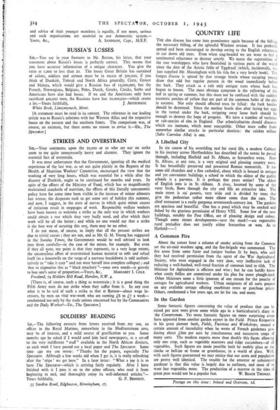STRIKES AND OVERSTRAIN
StE,—Your comments upon the 20,000 or so who are out on strike seem to me quite unnecessarily heavy and alarmist. They ignore the essential fact of overstrain.
It was most unfortunate that the Government, ignoring all the medical experience of the last war, as set out quite plainly in the Reports of the Health of Munition Workers' Committee, encouraged the view that the working of very long hours, which was essential for a while after the disaster of Dunkirk, ought to be continued for months and years. In spite of the efforts of the Ministry of Food, which has so magnificently maintained standards of nutrition, the effects of this literally uneconomic policy have for some time been visible in the increase of minor ailments last winter, the desperate rush to get some sort of holiday this summer, and now, I suggest, in the state of nerves in which quite minor causes of irritation result in stoppages of work. Responsible welfare workers have been known to welcome a strike as the only way in which workers could obtain a rest which they very badly need, and after which their work will be all the better ; and while no one would say that a strike is the best way of securing this rest, there may be no other.
I do not mean, of course, to imply that all the present strikes are due to trivial causes ; they are not, and as Mr. G. M. Young has suggested in the Sunday Times, the Government would be well advised to look into them carefully—in the case of the mines, for example. But even if they all were, my point is that they represent, to a very large extent, the unconscious effort of overstrained human material to refit and refuel itself (as a housewife on the verge of a nervous breakdown is told authori- tatively to "take it easy" and not wear herself into complete collapse) ; and that to stigmatise this as "black treachery "—your own words—is gravely
to lose one's sense of proportion.—Yours, &c., MARGARET I. COLE. Freeland, 74 Holders Hill Road, Hendon, N.W. 4.
[There is, of course, such a thing as overstrain ; it is a good thing the Fifth Army men do not strike when they suffer from it. In any case what is to be said of such a strike as that at Barrow—about wage in- creases, by men on vital war-work who are earning £6 to £7 a week— condemned not only by the trade unions concerned but by 'the Communists and the Daily Worker?—ED., The Spectator.]


























 Previous page
Previous page